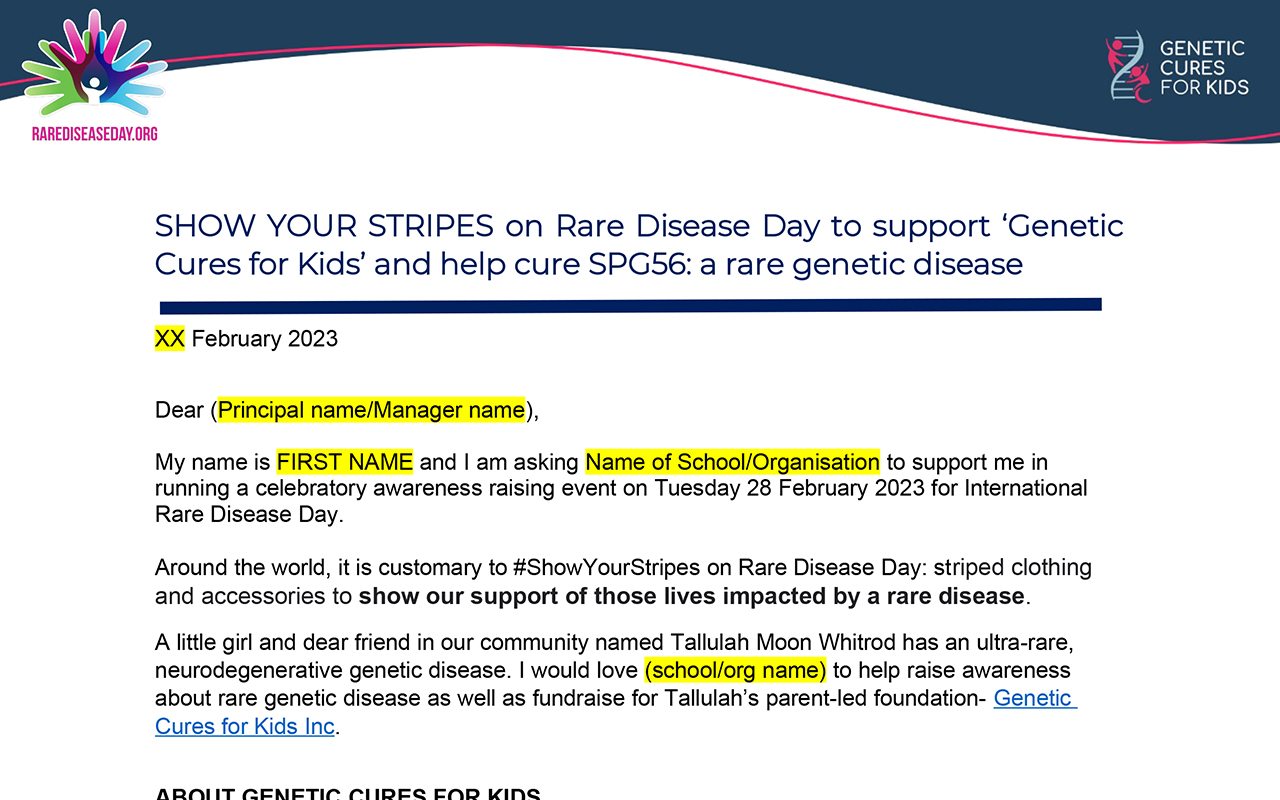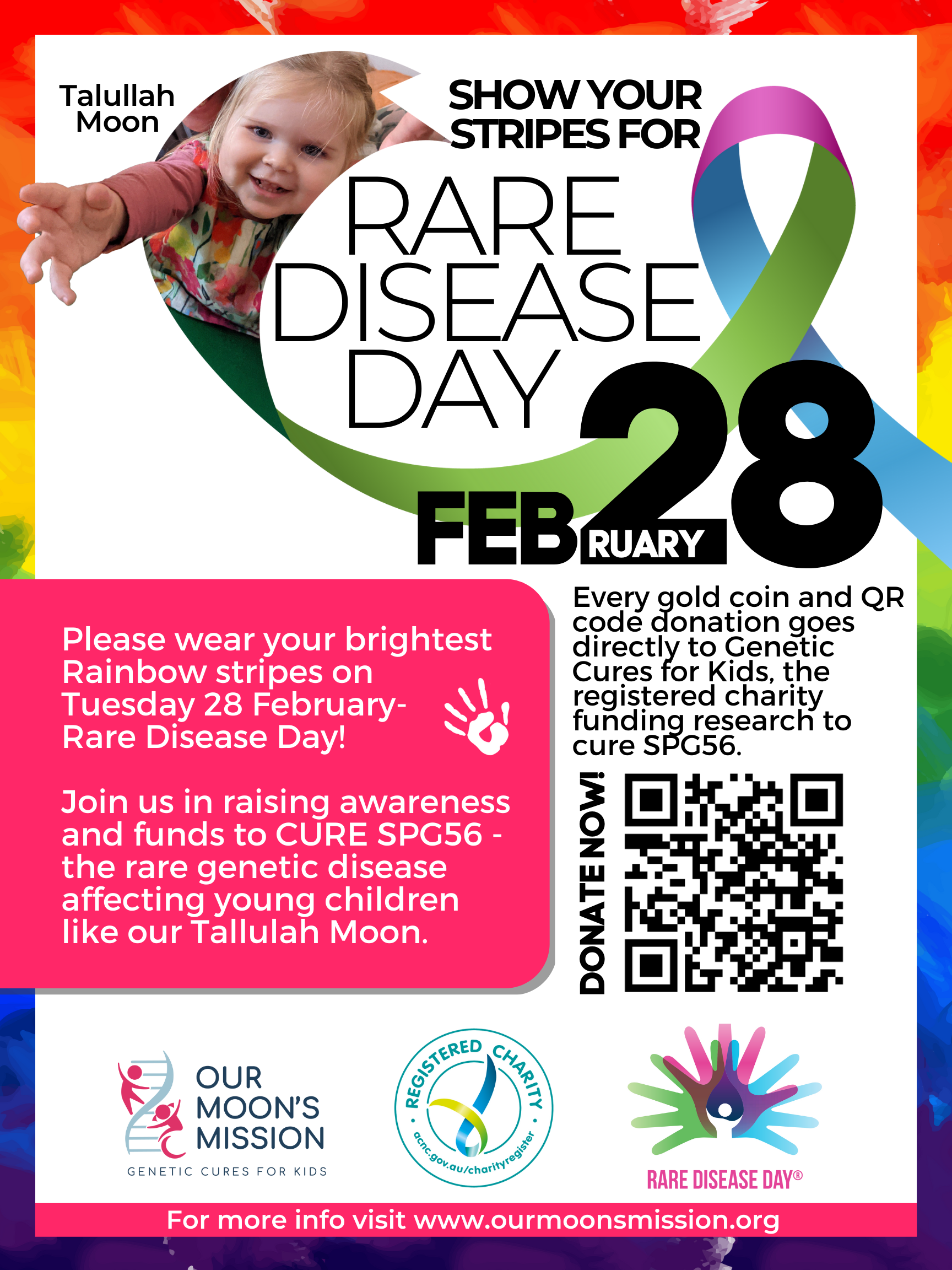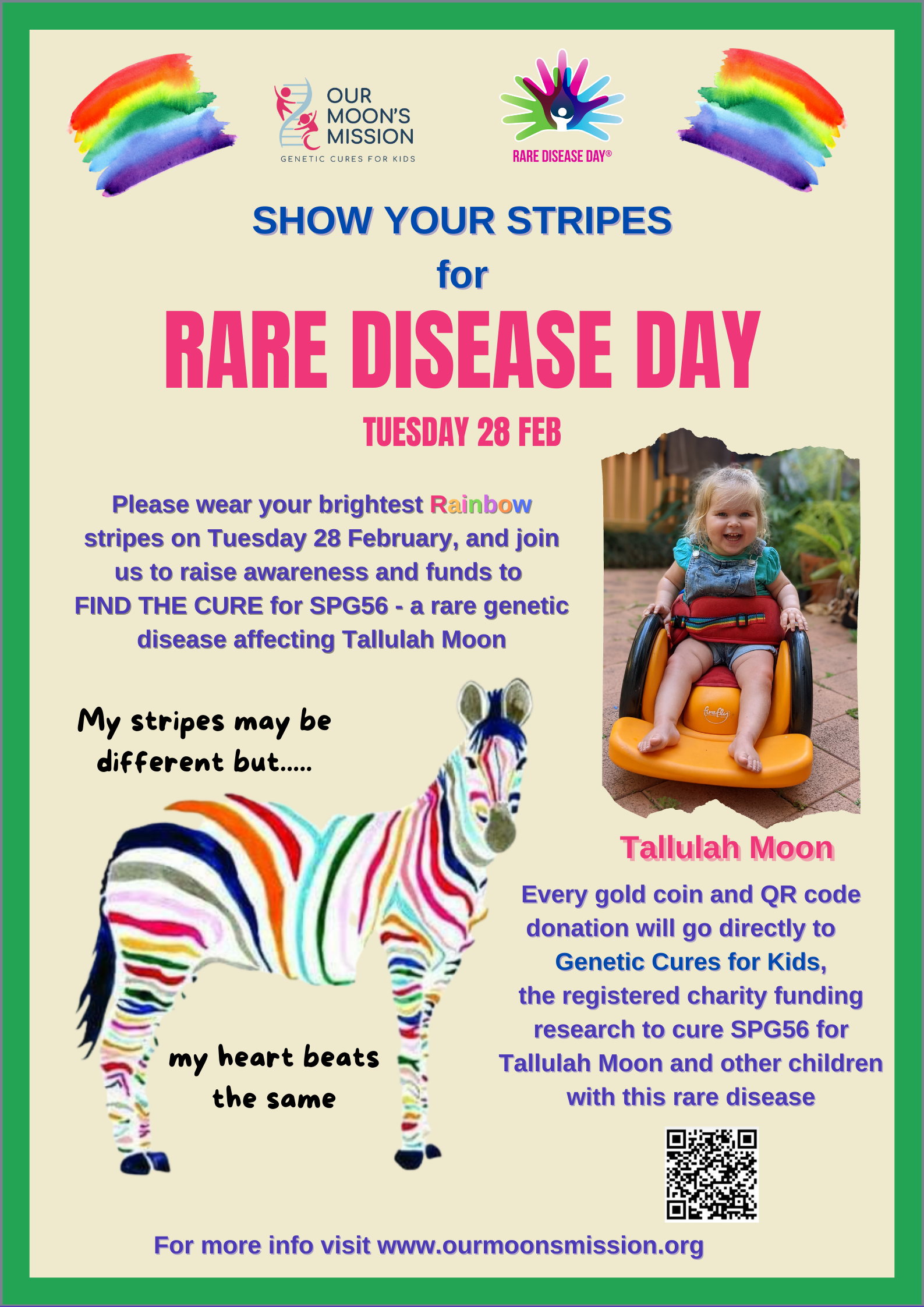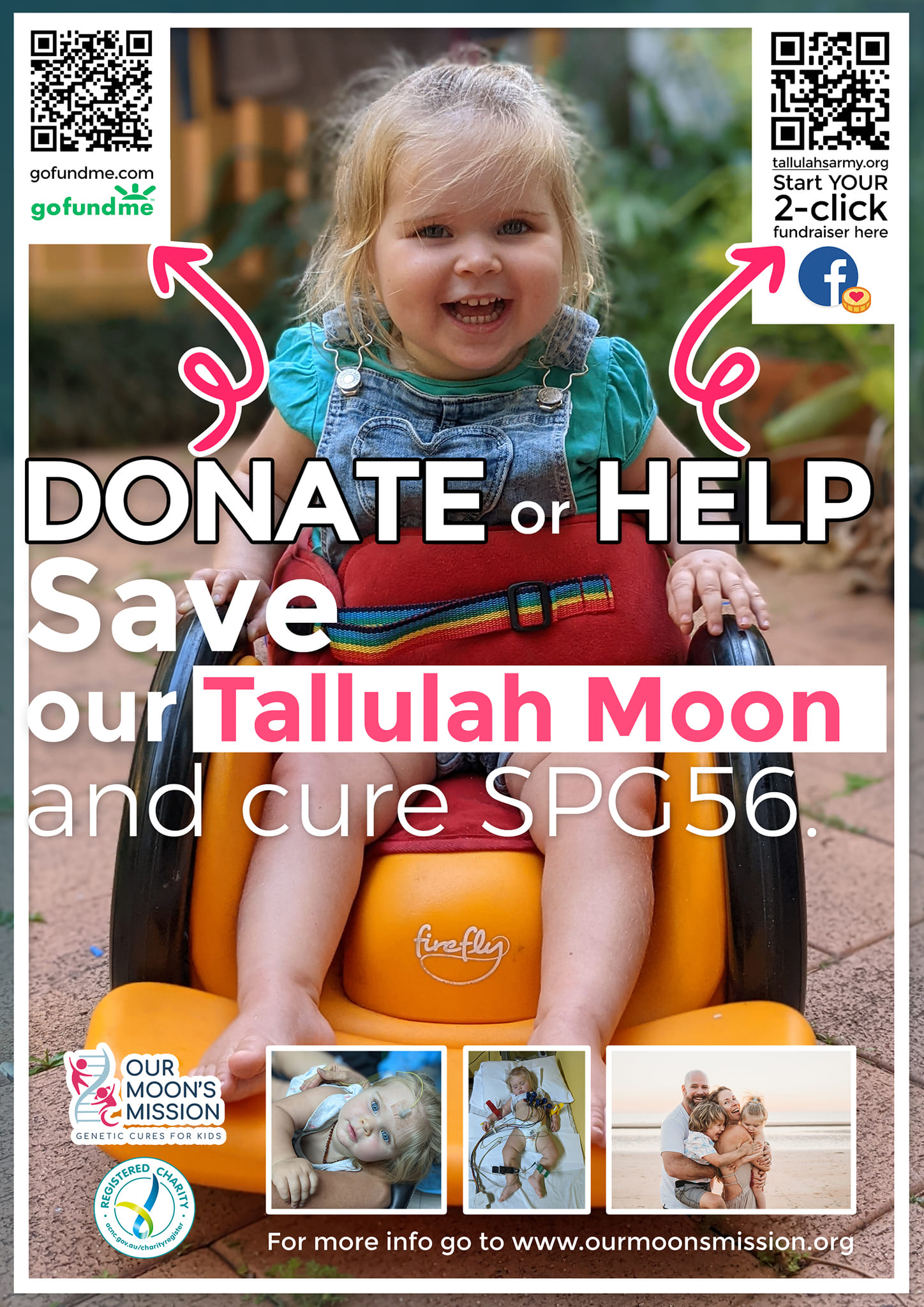
Show Your Stripes Template Letter
Template letter for support: Show Your Stripes for Our Moon's Mission, Genetic Cures for Kids

DONATE BY BANK TRANSFER TO GENETIC CURES FOR KIDS INC.
Account holder: Genetic Cures For Kids Inc
ACH and Wire routing number: 026073150
Account number: 8313288032
Account type: Checking
Bank name and address: Community Federal Savings Bank 89-16 Jamaica Ave Woodhaven NY 11421 United States
Bank Name: Commonwealth Bank Of Australia
SWIFT code: CTBAAU2S (Required only for International Transfers)
Account Name: Genetic Cures for Kids Inc.
BSB: 064-449
Account number: 1053 2492
Address: 85 Glenmount Road Mons Queensland 4556 Australia
International donors please note:
Australian accounts do not have IBANs. Instead, we use a BSB (bank, state, branch) identifier) and an account number.
Scientific Advisory Board Member, Our Moon’s Mission: Genetic Cures for Kids Inc.
Dr. Helene Puccio is a highly esteemed researcher in the field of hereditary ataxia, renowned for her expertise in generating models to understand the molecular mechanisms of these disorders and to develop novel therapeutic approaches. With a Ph.D. from the Harvard University and postdoctoral training at the Institute of Genetics and Molecular and Cellular Biology (IGBMC) in Strasbourg, Dr. Puccio obtained a permanent scientific research position at INSERM (Institut National de la Santé et de la Recherche Médicale), and is now research director of the Fundamental and pathophysiological mechanisms implicated in ataxia group at the Institut Neuromyogène (INMG). Dr. Puccio laboratory is dedicated to unraveling the causes and mechanisms of progressive recessive ataxias linked to mitochondrial dysfunction, with a particular interest in Friedreich ataxia and Autosomal Recessive Cerebellar Ataxia 2. Her research has brought major contribution in the field of FA, by developing the first animal models as well as cell models of the disease and using these models to gain an understanding of the disease mechanisms and prospects for treatment. Furthermore, H. Puccio’s research has brought significant contribution to the field of mammalian Fe-S cluster biogenesis and CoQ10 regulation.
As a member of the Scientific Advisory Board for Our Moon’s Mission: Genetic Cures for Kids Inc., Dr. Puccio helps guide our research efforts. Her extensive knowledge in creating and utilizing mouse models for studying genetic diseases has been instrumental in advancing our understanding of SPG56, a rare and challenging condition. Dr. Puccio’s expertise helps inform our strategies for developing gene therapies, ensuring that our research is both innovative and grounded in the latest scientific advancements.
Dr. Puccio’s contributions extend beyond research; she is also known for her collaborative approach and commitment to mentoring young scientists. Her involvement in various research networks and her role in academic peer review underscore her dedication to advancing the field of genetics. Her ability to translate complex scientific concepts into practical applications has greatly enhanced our approach to tackling genetic disorders and has been a key factor in the progress we have made.
With a distinguished career marked by numerous publications and accolades, Dr. Puccio’s involvement with Our Moon’s Mission is a testament to her significant impact on genetic research. Her continued support and guidance are invaluable as we strive to bring hope and innovative solutions to families affected by rare genetic diseases. Dr. Puccio’s dedication to scientific excellence and her role on our board are crucial in driving forward our mission to find a cure and improve patient outcomes.
Scientific Advisory Board Member, Our Moon’s Mission: Genetic Cures for Kids Inc.
Darius Ebrahimi-Fakhari, M.D., Ph.D., is a Child Neurologist and Neuroscientist with special expertise in childhood-onset neurogenetic, neurodegenerative, and movement disorders. He serves as the Director of the Movement Disorders Program and the Movement Disorders and Neurogenetic Fellowship Program at Boston Children’s Hospital and is an Assistant Professor of Neurology at Harvard Medical School. As a physician-scientist, the objective of his research is to understand the genetic and molecular mechanisms of childhood-onset movement disorders and to use this knowledge to develop novel therapeutic approaches to treat and cure a variety of neurological diseases.
Dr. Ebrahimi-Fakhari received his M.D. and Ph.D. degrees from Ruprecht Karl University of Heidelberg, Germany. After graduating, he trained in Pediatrics at Heidelberg University Hospital before returning to neuroscience research as a postdoctoral research fellow at the F.M. Kirby Neurobiology Center and the Department of Neurology at Boston Children’s Hospital, to study mechanisms of protein trafficking and degradation in neurons. After additional residency training in Pediatrics and Child Neurology at Boston Children’s Hospital and the Harvard Neurology Program, he completed a clinical fellowship in Movement Disorders at Boston Children’s Hospital and Massachusetts General Hospital.
Over the last years, Dr. Ebrahimi-Fakhari’s team has built a translational research program for childhood-onset movement disorders and neurodegenerative diseases, with a focus on Hereditary Spastic Paraplegia. This includes the first Registry and Natural History Study for Childhood-Onset Hereditary Spastic Paraplegia (ClinicalTrials.gov Identifier: NCT04712812) and a gene discovery platform (ClinicalTrials.gov Identifier: NCT05354622). His lab has made significant contributions to the understanding of childhood-onset forms of hereditary spastic paraplegia and other movement disorders. Collectively, Dr. Ebrahimi-Fakhari’s work has been published in over 90 scientific publications. He has been awarded the Outstanding Junior Member Award from the Child Neurology Society, the Outstanding Investigator Award from the German Society for Pediatric Neurology, and the Young Physician Scientist Award from the American Society of Clinical Investigation. Work in the Ebrahimi-Fakhari lab has been supported by the NIH/NINDS, the Spastic Paraplegia Foundation, Thrasher Research Foundation, CureAP4 Foundation, CureSPG50 Foundation, the Tom-Wahlig Foundation, The Manton Center for Orphan Disease Research, the BCH Office of Faculty Development, the BCH Translational Research Program, and Astellas Pharmaceuticals.
In his clinical practice, Dr. Ebrahimi-Fakhari cares for children with movement disorders and neurodegenerative diseases. He is an advocate for families with rare diseases and serves this community clinically and scientifically.
Scientific Advisory Board Member, Our Moon’s Mission: Genetic Cures for Kids Inc.
Rebecca Schüle, M.D., is an Adult Neurologist and Neuroscientist with special expertise in neurodegenerative motoneuron diseases and movement disorders. She serves as the Director of the Division of Neurodegenerative Diseases at the Heidelberg University Hospital and is Full Professor at the Ruprecht Karl University of Heidelberg in Germany. As a clinician-researcher the objective of her research is to advance novel treatments and cures for rare and ultrarare hereditary movement disorders.
Dr. Schüle received her M.D. from Ruprecht Karl University in Heidelberg, Germany. After graduating, she trained in Neurology and Movement disorders at the University of Tübingen under the guidance of Prof. Thomas Gasser. As a Marie-Curie-Fellow of the European Union, she intensified her research into genomics of rare movement disorders in the group of Prof. Stephan Zuchner at the John P. Hussman Institute for Human Genomics in Miami, Florida. Upon her return to the University of Tübingen, Dr. Schüle served as Residency Program Director and Clinical Practice Director at the Center for Neurology and, as senior faculty, took over the lead of the research group ‘Functional Genomics of Rare Movement Disorders’ at the Hertie Institute for Clinical Brain Research.
Over the last decade, Dr. Schüle has built a translational research program for ultrarare diseases with a particular focus on the group of Hereditary Spastic Paraplegias (HSP) and Ataxias. This includes the TreatHSP Registry and Biobank, an international natural history registry for HSPs. In leading international networks on HSPs and ataxias such as TreatHSP, PROSPAX and the HSP/Ataxia diseas group of the European Reference Network for Rare Neurological Diseases she has developed patient-focused progression and treatment response outcomes for HSPs such as the Spastic Paraplegia Rating Scale. Her group has further made major contributions to the field by discovering multiple novel disease genes and uncovering novel disease pathways for HSPs. In recent years she has pioneered development and application of tailored RNA therapies for ultrarare diseases as a founding member of the 1 Mutation 1 Medicine network. Dr. Schüle has published > 180 peer-reviewed publications; her work is funded by the European Union, National Institutes of Health (NIH), the German Ministry of Education and Research (BMBF), ‘Deutsche Forschungsgemeinschaft’ (DFG) and many others.
Thanks for choosing to become a sponsor! You are amazing!
Please fill in this form and we will be in touch very soon.

Discover the journey of hope and get the news as we reach our goals to cure SPG56 and save our Tallulah Moon.
Please complete the form below or email us directly at [email protected]
Please complete the form below or email us directly at [email protected]
Please complete the form below or email us directly at [email protected]
You’ve clicked to this page; you’ve already shown us you care. Thank you for wanting to support us!
You can pick any of these ways to help and you will be directly sharing in this life saving mission – to cure SPG56 and save our daughter.



